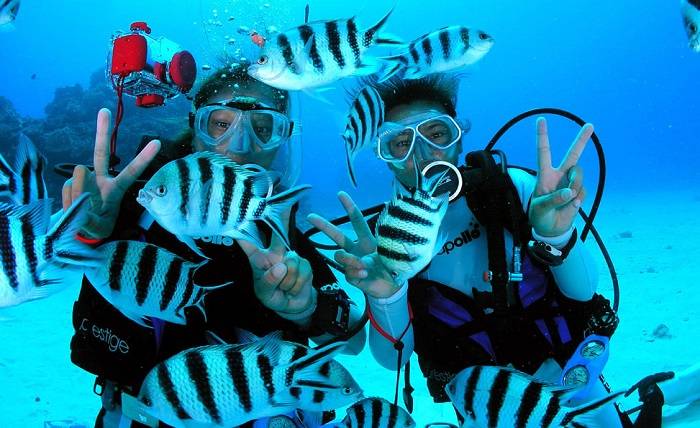Opening up access to an entirely new and wonderful watery world, scuba diving enables you to explore the deep blue sea like a pro. From reef diving and exploring cenotes, to diving with sharks, nothing gives you an experience quite like scuba diving, and what’s even better; it can improve your health and be a great stress-reliever, too.
If you’re interested in exploring the wonders of the deep blue sea, becoming a certified scuba diver through a diving course is your first step.
What is a diving certification course?
Designed to help you achieve whatever level of diving you want to get to, such as: open water, advanced open water, rescue diver and dive master/guide, a diving certification course includes both theory and practice work, both of which you will be guided through by your qualified instructor.
All of the diving equipment you’ll need on your certification journey are provided for you, and the final exam will always be conducted by a Scuba Explorer instructor who is DEF certified.
There are several courses to choose from, such as DEF Open Water and PADI.
For more details, contact a diving company in your locality who will be happy to help you.
What are the benefits of becoming a certified scuba diver?
Once you’ve gained your certification and are a fully qualified scuba diver, you can start putting all of your training into practise, and go on diving adventures with your friends. But there are other advantages, too:
- You’ll have access to all the best equipment and tours
Shops renting dive equipment to anyone will need to see evidence that they have been awarded a diving certificate; without one, you won’t even be able to book a diving tour, at least not with a legitimate tour company, anyway!
- You can start exploring unchartered waters
While you might not necessarily be diving where nobody has ever dived before, with your newfound certification you can still get off of the beaten track, so to speak, and explore some stunning dive locations with opportunities to see weird and wonderful marine life, along with wrecks and reefs. Whether with a group and an instructor, with a group of fellow dive enthusiasts, or solo, you can put your skills to the test and give yourself a challenging but satisfying dive experience.
- You could take a PADI Divermaster course
Once you’re a certified diver, you can move on to other, more advanced courses and try out photography or videography underwater, or even diving with sharks. You may also want to consider taking the PADI Divermaster course, which enables you to enhance your rescue skills, and anticipate problems with a dive. Note that this particular course can only be completed once you’ve dived at least 40 times, and taken an official course in First Aid.
- Become a Master Scuba Diver
Once you’ve obtained 5 specialties (diving with sharks, diving at night, diving in caves and cenotes, and exploring sunken ships) and verified 25 PADI divers, you have the opportunity to become a Master Scuba diver. The course can be finished within a year, in which you’ll sit an exam about the physiology and physics of diving, skills and equipment, and how to use a recreational scuba planner, before you’re a fully paid up qualified scuba diver who can organise and host courses, provide evaluations and counseling, and assist other instructors with PADI diver training courses.
Whether you want to dive recreationally, or make a career out of it, diving certification can open up a lot of doors and provide many opportunities for you to indulge in what you love.









